Microsoft's E3 2019 message: Xbox is more than just a console
Among all the awesome games, Microsoft's Xbox team was sending one clear message: we're more than just a box under your TV.
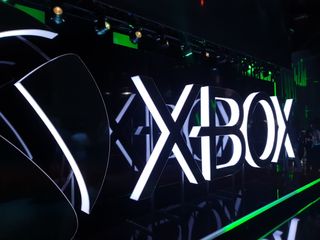
As E3 2019 comes to a close for another year, in among all the amazing game trailers and announcements, Microsoft was sending a powerful signal that stood out above all other things for me. Although the writing has been on the wall for many years for those who have been following along, E3 2019 felt like the first time Microsoft itself was willing to stand up and shout that Xbox is more than just a box under your TV.
The sheer volume of content, features, and announcements that weren't specifically Xbox console-centric far outshone previous years, and perhaps more crucially, everything Microsoft announced for PC and other platforms was good. It's a departure from previous years, where pandering to the prevailing internal Microsoftian, often Windows-led ideology of the time took precedent over what consumers actually wanted.
None of this means Microsoft is forgetting its home console platform, though, revealing the next Xbox, Project Scarlett, for the first time, a codename my colleague Zac Bowden revealed first here on Windows Central.
So what is the real implication of all this? Microsoft's goal is to build platforms and games for literally everyone, everywhere. The entire market, two billion gamers strong, across all sorts of platforms and services. Microsoft wants to be the glue that ties your gaming life together, wherever you are and wherever you play, and they're better placed than most to pull it off.
Project xCloud and the promise of "everywhere"
I finally got to try Project xCloud for myself at E3 2019, hooked up to a Microsoft data center some 400 miles away from the Microsoft Theatre in Los Angeles. While there's still some very slightly perceptible latency, I described it as being less significant than running an Xbox to a TV without Game Mode turned on. My colleague Matt Brown perhaps described it best to me, he was able to hit every active reload on Gears of War while playing, which would be impossible with poor latency.
Related: Project xCloud is real. It is insane.
Of course, there's no way to know for sure how good Project xCloud will be in the real world until you have it in the palm of your hands. But let's just assume it works as well as it did for me at E3 for the sake of argument. If Microsoft nails xCloud, make no mistake, it could upend the entire industry in much the same way Netflix and Spotify changed the game for media and TV respectively. The very idea of being able to take your entire game library with you to any device isn't exactly new, but nobody has really delivered on that promise yet. Microsoft appears as though it could be the first to truly deliver.
Get the Windows Central Newsletter
All the latest news, reviews, and guides for Windows and Xbox diehards.
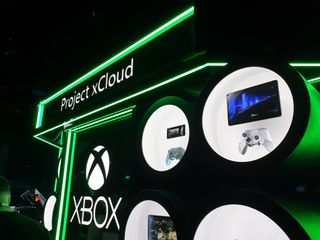
Redmond's chief competitor right now is, of course, Google, with its Stadia platform. In terms of latency, Stadia is reportedly quite good, but the platform faces an uphill battle to get content, as it will require developers to spend time and effort to port their games to the Stadia platform. For Xbox, the work is already done, for the most part, a developer need only flip a switch to push their game across the service, targetting quite literally hundreds of millions, billions of devices on all sorts of platform.
Game streaming via the cloud well and truly is Microsoft's game to lose right now.
Repairing the damage with PC gamers and devs
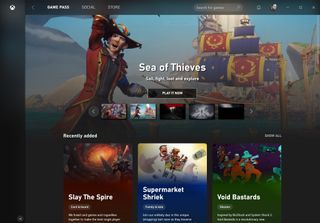
Another big slice of the growth pie is on Microsoft's very own platform, Windows PC, which it gave away to distribution platforms like Steam owing to decades of misunderstanding (or simply dismissing) what makes PC gaming great. With gaming at Microsoft elevated to the senior leadership team, for the first time in the company's history, gamers are driving what happens on Windows, instead of Windows execs more beholden to the operating system than what consumers actually want.
Microsoft unveiled a range of new mechanisms and services for PC in the run-up to, and during E3 2019, including Discord-like Gamertag suffixes to give players more control over how they present on Xbox Live. A new Windows 10 Game Bar app gives PC gamers quick access to recording and sharing, as well as performance monitoring and other tools, like Spotify controls. The biggest upgrade is the Xbox app itself, which finally gives core PC gamers a place to find Microsoft titles without having to dig through the frankly awful Microsoft Store for apps (which itself is due an overhaul). Game developers can now bring their games to the Microsoft Store without first porting them to UWP, too, since Win32 programs are now fully supported. Microsoft isn't forcing developers to adopt the Xbox Live APIs either, despite their availability for Win32.
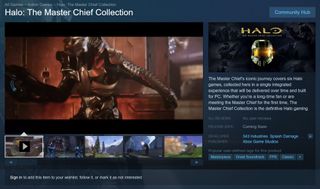
Despite solving its own app delivery mechanisms, Microsoft isn't going to try and compete directly with other PC stores, opting instead to nurture them as part of the wider Windows PC ecosystem. Microsoft is planning to bring first-party titles to Steam, including Halo itself. Microsoft is also exploring a partnership with GOG to bring Xbox Game Pass for PC and even Xbox Live chat integration to a future version of CD Projekt's own PC store.
Hitting other platforms hard
Continuing with its push outside of Xbox's traditional markets, Microsoft is making waves with its remarkable take on Pokemon Go, dubbed Minecraft Earth, leveraging the power of Azure and open street maps to really push the possibilities of augmented reality. We tried Minecraft Earth out for ourselves at E3 2019, and we'll have a full preview up soon. I fully expect Minecraft Earth to be truly massive, though, owing to Minecraft's near-ubiquitous appeal, and the simple fact that it already seems like it's ready for the prime time, ahead of its Summer 2019 beta tests.
Microsoft also made its presence known during Nintendo's showcase, lending its Banjo-Kazooie IP to Smash Bros Ultimate to rapturous applause. This comes during rumors of more support for the Nintendo Switch with some of its own games, as well as quite possibly Project xCloud itself. Cuphead will eventually be the second game, joining Minecraft, to use Xbox Live APIs on the Switch. Microsoft is also publishing Minecraft Dungeons not only on Nintendo Switch, but PlayStation 4 as well, which practically guarantees it'll be a huge sales hit − if the final product is as awesome as it seems, that is.
A platform for two billion gamers, with Xbox as the central pillar
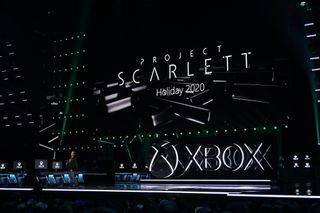
Microsoft may be building out its portfolio to incorporate mobile devices, Windows PC, and maybe even Nintendo Switch down the line, but that doesn't mean Microsoft is forgetting where it earned the bulk of its gaming fans. Microsoft unveiled Project Scarlett during its E3 2019 show, touting 8K resolution, 120 frames per second, and the near-elimination of loading times. Microsoft is also investing more in content than it ever has, picking up another studio, Double Fine, for its in-house roster. It also offered glimpses of Gears of War 5, Halo Infinite, Ori and the Will of the Wisps, Bleeding Edge, Flight Simulator, Minecraft Dungeons, and various other first-party titles that will come first to Xbox Game Pass.
No matter where you want to play, no matter how you want to play, Microsoft is exploring ways to bring that content to you.
Despite this big foray into new technologies with game streaming, and the re-emergence of Win32 and other PC efforts, Microsoft still wants Xbox consoles to offer the best home gaming experience possible. Despite swirling rumors that cloud compute could replace PC and console gaming entirely, Microsoft has reiterated to us that it believes there will always be a market for local gaming, implying very strongly that Scarlett will not be the last Xbox console.
Microsoft not only sees the limitless potential of leveraging its massive data center clout in gaming, but truth be told, I genuinely believe from talking to various members of the executive team throughout E3 2019 that they simply want to make a good set of products. The Xbox of yesteryear has been hamstrung by budget limitations, and support for Windows technologies that were often half-baked at best. The Xbox leadership sees gaming as a unifying force for social good, through the joy of play, intrinsic to our humanity and well-being. That is why Microsoft is championing technologies like the Xbox Adaptive Controller, helping schools to leverage Minecraft as an educational tool, and building interactive tools on Mixer to promote healthy gaming communities.
There's still an argument that Microsoft needs to do more to meet PlayStation and others on upping its in-house game development, but we're already starting to see the fruits of those efforts with Ninja Theory's Bleeding Edge, and Mojang's Minecraft Dungeons, with the big guns likely to drop in 2020 when it has to go up against Sony to make the case for its next-gen console.
Regardless of all that, though, the message is clear: no matter where you want to play, no matter how you want to play, Microsoft is exploring ways to bring that content to you, on any device. It's time to stop thinking of Xbox as that console sitting under your TV − if Microsoft nails its plans, it'll become so much more.

Jez Corden is a Managing Editor at Windows Central, focusing primarily on all things Xbox and gaming. Jez is known for breaking exclusive news and analysis as relates to the Microsoft ecosystem while being powered by tea. Follow on Twitter @JezCorden and listen to his XB2 Podcast, all about, you guessed it, Xbox!
